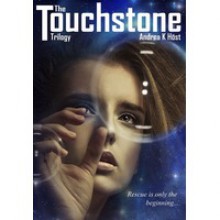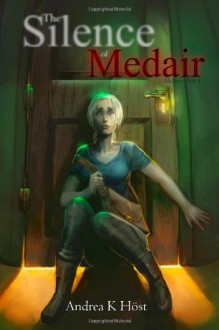I’ve been on a bit of an Andrea K Host kick recently, first with Stray and then The Silence of Medair. (I read And All the Stars earlier this year and loved it.
Stray and Medair are quite different in overall sensibility. Stray is written as a diary, from the point of view of a teenage girl, and the worldbuilding is more science-fictional. Medair is told in tight third person, Medair’s age is not given but reads as perhaps mid to late twenties or early thirties, and it is definitely a fantasy (unless some bizarre explanation in the second book pushes it into SF).
And yet, both share this sense of dislocation, of being set out of time or out of space. Cassandra walks from Australia into another universe, Medair wakes five hundred years late. The bulk of both stories deals with the fall-out from this exile, both personally and politically. In a world that they don’t really understand (Cassandra more so than Medair), both characters must decide whether they will stay, whether they will cast in their lot and engage with this unfamiliar landscape or remain separate and alone.
In case it’s not clear, I thoroughly enjoyed both books. I’ve already started Voice of the Lost, and asked for Lab Rat One on inter-library loan.
It’s also true that both Cassandra and Medair spend quite a bit of their respective books reacting rather than acting, but this makes sense in the context of the story, and I never felt like they were passive characters. Of course, I’m more of a character-based reader than a plot-based reader, so books where the plot is “character coming to terms with their situation and themselves” doesn’t turn me off the way it would some people.
Stray begins with Cassandra’s notes after she steps through into a different world. It’s at times a slightly frustrating read because we’re so much in Cassandra’s timeline, and from the reader’s perspective something is clearly going to happen. However, once it does the pace picks up quite a bit. And I did appreciate that Host spends so much time on the mechanics of survival–Cassandra has less than Robinson Crusoe and modern life is much less suited to surviving when you’re suddenly pitched into a wilderness. Especially a wilderness full of completely unfamiliar fruit, which might save your life or might kill you.
Cassandra herself is a familiar and beloved kind of heroine. Bookish and nerdy, inward-gazing if not introverted, she has a strong moral compass and part of the strength of the book is the way she considers the consequences of her choices. She’s also not as boring as this makes her sound: her voice is clear and quite teenagerish, and I really enjoyed her sense of humor.
The sense of dislocation comes from the fact that her family has no idea where she has gone, that she can’t go back. She’s pitched into a strange world, with (slight spoiler) people she can’t at first understand and a society which is dramatically different from ours. And she has moments when she resists the situation she finds herself in, using Earth-based humor in a way the others won’t get. But I also suspect she is in some ways mis-reading situations and relationships in a wholly understandable and very human way. With lots of unresolved strands, this book certainly read as the first book in a trilogy, but in a “I have to read the next one now!” way.
Medair starts off much more in the middle of things, and gallops off from there. Medair, a Herald of Farrakkan, went in search of a legendary magical object to end the war her people were fighting. But she comes back five hundred years too late, the war long gone and the invaders thoroughly ensconced. When Medair rescues an Ibisian and has a geas put on her as a result, she must face the world she had retreated from, and decide what her place in it is.
Again, I’ve made that sound way too boring. I liked Cassandra a lot, but I really liked Medair. She’s older and a little sadder than Cassandra, without the burning sense of her own rightness to keep her going. And she struggles with her growing sense of the Ibisians as people, not simply the enemy she fought against (even that was complicated by her stay with the Ibisian ruler). Her ultimate choices didn’t surprise me, but they did leave me a very satisfied reader.
I’ll also note that I really enjoyed the worldbuilding here, the sense of history and politics, and the descriptions of landscapes and settings. Perhaps it’s just that I’m really a bit more of a fantasy reader but: I liked Stray a great deal, I loved Medair.
(As a complete side-note, I really like the covers for these books! One of my small gripes with self-publishing is that the quality of the covers is often not good [granted that is also sometimes true of big publishing houses, but it seems to be more often true of self-published books] and I appreciate that Host has put in the effort and money to have really quality covers for her books.)
Book source: ILL (Stray), purchased ebook (Medair)
Book information: 2011 (Stray), 2010 (Medair), self published; YA and adult respectively, though there’s no reason they can’t be crossovers


 Log in with Facebook
Log in with Facebook 










